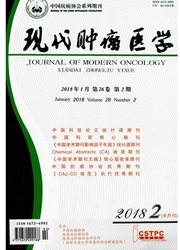

 中文摘要:
中文摘要:
目的:探讨Canstatin基因导入对裸鼠人肝癌皮下移植瘤的生长及肿瘤血管形成的作用。方法:建立肝癌HepG2细胞裸鼠皮下移植瘤模型并鉴定,运用Ad-Canstatin/GFP基因治疗,Western blot法检测转染后瘤组织内Canstatin蛋白的表达。治疗期间观察Canstatin对裸鼠及移植瘤生长的影响,用药后HE染色观察肝肾损害,计数外周血白细胞数目;免疫组织化学法检测瘤内微血管密度(microvascular density,MVD)及血管生成拟态(vasculogenic mimicry,VM)的数目。结果:成瘤率100%。Ad-Canstatin转染组Canstatin蛋白表达增多;Ad-Canstatin组裸鼠食量大于两对照组(P〈0.05)。同时排泄量、饮水量均少于两对照组(P〈0.05)。体重生长曲线显示Ad-Canstatin组体重持续增加,两对照组体重后期出现不增或下降趋势。Ad-Canstatin组移植瘤瘤体积增长缓慢,治疗第10天,瘤体积小于两对照组(P〈0.05);Ad-Canstatin组瘤重小于两对照组(P〈0.05),抑瘤率:37.50%。Ad-Canstatin组肝、肾、造血系统未见异常。Ad-Canstatin组MVD、VM数目均少于两对照组(P〈0.05)。结论:腺病毒介导Canstatin基因可通过抑制瘤内血管生成,从而抑制HepG2肝癌移植瘤的生长,实验期内未见明显不良反应。
 英文摘要:
英文摘要:
Objective:To investigate the effect of Canstatin gene therapy on growth and angiogenesis of transplanted HepG2 liver cancer in nude mice.Methods:Transplanted HepG2 liver cancer mouse model was established,using Ad-Canstatin/GFP gene therapy.The expression of Canstatin protein in transfected tumors were detected by Western blotting.Therapeutic effect of Ad-Canstatin/GFP on transplanted HepG2 liver cancer was observed.The damage of kidney and liver were observed by HE dyeing,and the number of WBC in blood was counted.Microvascular density and vascular mimicry formation of transplanted tumors in different therapy groups was observed by immunohistochemistry.Results:Into tumor rate was 100%,and Ad-Canstatin group of nude mouse appetite was greater than the two control group(P0.05).Drinking water and excretion was less than the two control group(P0.05).Weight growth curve displayed that Ad-Canstatin group was increased,but two control group was not increase or decrease.The tumor volume of Ad-Canstatin group growth more slowly than two control group,and the difference in treatment of the first 10 days(P0.05).The tumor weight of Ad-Canstatin group less than two control group(P0.05),and inhibiting tumor rate:37.50%.In Ad-Canstatin group liver kidney hematopoietic system were noumal.The number of MVD,VM in Ad-Canstatin group were less than two control group(P0.05).Conclusion:Adenovirus mediated Canstatin gene can inhibit tumor angiogenesis,thus inhibiting transplanted HepG2 liver cancer tumor growth,no side effects in the experiment.
 同期刊论文项目
同期刊论文项目
 同项目期刊论文
同项目期刊论文
 期刊信息
期刊信息
